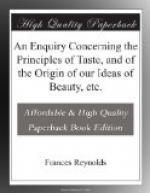When discussing the Enquiry in his book on the Sublime, Samuel Monk pointed out certain other tendencies which fore-shadow the coming Romantic revolt. This shift may also be noted in Miss Reynolds’ extension of countenance, the reflection of internal virtue, to mean “form,” and the extension of internal virtue to mean “disposition,” “object,” or content. In developing this form-content division, she stumbles on a key criticism of associationism: “From association of ideas, any object may be pleasing, though absolutely devoid of beauty, and displeasing with it. The form is then out of the question; it is some real good or evil, with which the object, but not its form, is associated.” This notion that associationism leads away from the work of art as such is a perceptive comment. Her notion that form and disposition (or content) must correspond in order to give aesthetic pleasure suggests, though the terms are different, certain of Coleridge’s basic ideas.
One other point might be stressed: Miss Reynolds takes an extreme moralistic position toward the arts. Again and again it is insisted that taste and beauty are moral attributes, not purely aesthetic concepts. Chapter II ends with the ringing statement: “Of this I am certain, that true refinement is the effect of true virtue; that virtue is truth, and good; and that beauty dwells in them, and they in her.” And the next chapter begins: “Taste seems to be an inherent impulsive tendency of the soul towards true good.” On the other hand, she sees that the arts are not to be encouraged because such encouragement is apt to lead to the destruction of moral virtue—the desire for fame and wealth. The value of art as education is dismissed as of importance only to the few; the dangers of encouragement will imperil the many. “Though the arts are thus beneficial to the growing principles of taste, respecting a few individuals, it is well known that their establishment in every nation has had a contrary effect on the community in general....”
To conclude: despite its many deficiencies Frances Reynolds’ Enquiry is worth reading. It serves admirably to mirror the conflicting eighteenth-century theories out of which our own aesthetic concepts have been formed.
James L. Clifford
Columbia University
Notes to the Introduction
1. Letters, II, 223-24; corrected from original letter in possession of Professor F.W. Hilles of Yale University, who has given invaluable aid in the present investigation.
2. Letters, II, 249-50, corrected from the original by Dr. R.W. Chapman.
3. Copy in possession of Mrs. Doreen Ashworth, Windlesham, Surrey.
4. Original in Huntington Library.
5. Original in possession of Mrs. Ashworth.
6. Rough draft in possession of Mrs. Ashworth.
7. Original in possession of Professor F.W. Hilles.




